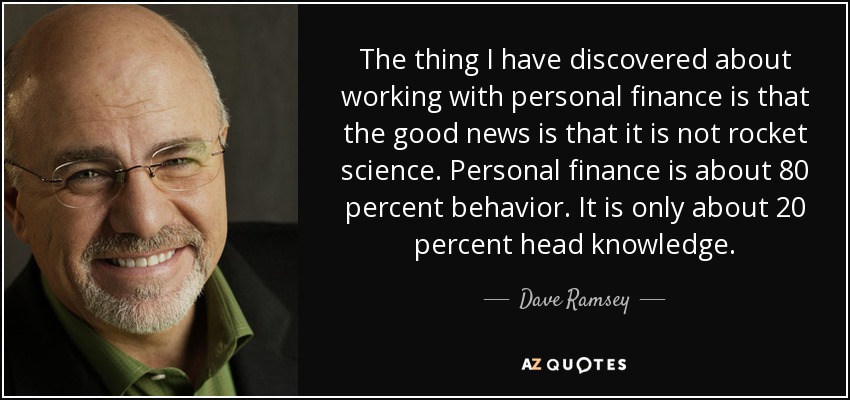Approximately 80% of personal finance is behavior, according to financial experts. This significant percentage highlights the importance of habits and mindset in managing money effectively.
Understanding personal finance often goes beyond mere numbers and economic principles; it fundamentally rests on individual behavior. A person’s success in managing their finances is primarily dictated by their ability to exhibit self-discipline, make informed decisions, and resist impulsive purchasing.
Contrary to common belief, effective financial management is less about sophisticated investment strategies and more about everyday choices. It involves setting realistic goals, creating budgets, and sticking to them, which are all behaviors that one can control. Recognizing the significant role that behavior plays in personal finance can be the first step toward taking charge of one’s financial future. By embracing good financial habits and consistently applying them, individuals can markedly improve their financial stability and progress toward long-term wealth.
The Role Of Behavior In Personal Finance
Understanding personal finance is not just about numbers. It’s about behaviors. What we do with our money is as important as how much we have. In fact, behavior might be the biggest part of personal finance success. People often know what they should do. Yet, they struggle to do it. Saving money, avoiding debt, investing for the future – all are simple concepts. Yet, they are hard to stick to because of behavior. Behavior drives choices. So, let’s explore how habits and emotions impact financial health.
Influence Of Habits On Spending And Saving
- Habits form the backbone of our financial lives.
- Daily choices turn into habits. These habits can make or break saving goals.
- Coffee or cooking at home? Habits decide that.
- Tracking expenses can turn into a positive financial habit.
- Good habits keep our spending in check and bolster savings.
Habits often rule over the wallet. Daily small spends add up. A lunch here, a coffee there. Changing habits can lead to big savings. Let’s say you buy coffee daily. That might cost you $100 a month. Cut that in half, you save $50. Do it every month, that’s $600 a year into your savings. Habits, whether good or bad, form a financial path we follow.
Emotional Decision-making And Money Management
Emotions are powerful. They push us to spend or save. Happy? You might treat yourself. Sad? You might comfort buy. Emotions drive spending more than we think.
- Recognize emotional spending triggers to control them.
- Setting financial goals can guide our emotions.
- Learn to pause and think before any big purchase.
Think of a time you made a quick buy. Later, you might have regretted it. That’s emotional spending. A clearer head makes for better decisions. For example, use a wish list. Before you buy, put it on your list. If it is still important after 30 days, consider it. This pause can help manage emotional spending. It can keep your money goals on track.

Credit: www.linkedin.com
Breaking Down Financial Success
Many believe a solid investment strategy or a high income paves the way to wealth. Yet, behavior holds the key to financial success. In personal finance, behavior often overshadows numbers. Let’s explore the core behaviors contributing to wealth and review examples illustrating the power of habits over pure math.
Key Financial Behaviors That Impact Wealth Building
To secure financial health, certain behaviors prove more crucial than others. These patterns shape our financial landscape:
- Budgeting: Regularly tracking expenses ensures spending aligns with goals.
- Saving: Prioritizing savings leads to a robust safety net.
- Investing: Investing wisely increases wealth over time.
- Debt Management: Controlling debt prevents financial strain.
- Risk Taking: Calculated risks can yield higher returns.
- Patience: Long-term thinking beats short-term gratification.
- Continuous Learning: Keeping informed about finance grows knowledge.
Case Studies: Behavior Vs. Mathematical Precision
Real-life stories offer insight into behavior’s role in financial outcomes versus strict number crunching.
| Case Study | Behavioral Factors | Financial Result |
|---|---|---|
| Sarah’s Saving Habits | Consistent saving, even with lower income | Built a comfortable retirement fund |
| Mike’s Debt Reversal | Aggressive debt repayment plan | Debt-free within five years |
| Lisa’s Investment Approach | Regular, diversified investments | Achieved financial independence |
Each example highlights action over arithmetic. Sarah saved diligently, showcasing the compound effect of consistent behavior. Mike cut down spending and prioritized debt elimination. Lisa’s intelligent investing outperformed any fancy algorithm.
Psychology And Money Management
Personal finance is not just about numbers. It deeply roots in mindset and behavior. Understanding money management psychology plays a crucial role in financial success. It’s not always about what you earn, but about how you think and act with money.
Cognitive Biases Affecting Financial Choices
We often think we make rational money decisions. But our brains can trick us. Cognitive biases impact our financial behavior without us realizing. Here are some common biases:
- Confirmation bias: Seeking information that supports our beliefs, ignoring what doesn’t.
- Overconfidence: Overrating our investment choices or skills.
- Loss aversion: Fearing losses more than valuing gains.
- Anchor effect: Relying too much on the first piece of information.
Recognizing these biases helps in making smarter financial choices.
The Importance Of Financial Literacy And Mindset
A strong financial literacy foundation is crucial. It’s vital in developing a positive money mindset. Knowing how money works empowers better decisions. Consider these steps to improve your financial literacy:
- Read books and articles on personal finance.
- Use budgeting tools and apps.
- Attend workshops or webinars.
- Seek advice from financial experts.
A positive financial mindset combined with knowledge leads to better money management. You take control of your finances, not the other way around.
Quantifying Behavioral Impact
Strategies To Enhance Financial Behavior
Understanding that a large part of personal finance is governed by behavior is crucial. Developing strategies to enhance financial behavior can lead to a healthier financial life. Below are some tactics aimed at fostering positive financial habits and the use of modern tools to aid behavioral change.
Adopting Positive Financial Habits
Cultivating good financial habits is at the core of solid personal finance. Here are some strategies:
- Create a budget: Track income and expenses to manage money effectively.
- Build an emergency fund: Save regularly to cushion against unforeseen costs.
- Leverage automatic savings: Use auto-transfer to save without thinking about it.
- Invest in knowledge: Read books and articles to improve financial literacy.
- Practice debt management: Prioritize paying off high-interest debt swiftly.
Tools And Technologies To Support Behavior Change
Incorporating tech solutions can streamline the process of changing financial behavior. Consider the following tools:
| Tool | Function |
|---|---|
| Budgeting apps: | Track spending and set budget goals on-the-go. |
| Savings apps: | Automate savings and visualize progress. |
| Debt repayment tools: | Plan and monitor debt payoff strategies. |
| Financial planning software: | Get a comprehensive view of financial health. |
| Investment trackers: | Keep tabs on investments and market trends. |

Credit: quotefancy.com
Leveraging Behavioral Economics
Leveraging Behavioral Economics in Personal Finance sheds light on a fascinating facet of our financial lives. It’s not just about the numbers. It’s about how we think, feel, and behave with money. This intriguing blend of psychology and economics suggests that an overwhelming part of personal finance hinges on behavior. Often, it’s the subtle nuances of human behavior that play a pivotal role in shaping our financial health and decision-making.
Applications In Personal Finance
Behavioral economics reveals interesting insights into financial habits. It shows how emotional triggers and cognitive biases can sway our financial choices. By understanding these patterns, individuals can hone their money management skills. For instance:
- Impulse Buying: Awareness of triggers can help reduce its frequency.
- Saving Behavior: Setting automatic savings can counteract procrastination.
- Investment Choices: Recognizing biases can lead to more rational decisions.
Nudging Towards Better Financial Decisions
One powerful concept from behavioral economics is the ‘nudge.’ Nudges are small changes that can lead to big improvements in financial behavior. They steer people gently towards better choices without restricting freedom. Examples of effective nudges in personal finance include:
| Nudge Technique | Expected Outcome |
|---|---|
| Automatic Saving Plans | Increases Savings Rate |
| Reminders for Bills | Reduces Late Fees |
| Default Investment Options | Boosts Retirement Funds |
Integrating such nudges into personal finance strategies can significantly enhance financial well-being. Behavior is a complex component of personal finance, but leveraging the right tools and understanding can lead to positive financial outcomes.

Credit: www.azquotes.com
Frequently Asked Questions On What Percentage Of Personal Finance Is Behavior?
Is 80 Percent Behavior Personal Finance?
Yes, roughly 80 percent of personal finance success is attributed to behavior, such as spending and saving habits, rather than mere financial knowledge.
What Is The 50 20 30 Rule?
The 50/20/30 rule is a budgeting framework that allocates income as follows: 50% for essential needs, 20% for savings and debt repayment, and 30% for wants and discretionary expenses.
What Is The #1 Rule Of Personal Finance?
The #1 rule of personal finance is to live within your means, ensuring you spend less than you earn.
Is Personal Finance Dependent Upon Your Behavior?
Yes, personal finance greatly depends on individual behavior, as financial habits and decisions impact one’s fiscal health. Good behaviors, like budgeting and saving, contribute to financial stability.
How Crucial Is Behavior In Personal Finance?
Behavior plays a key role in personal finance, often impacting over 90% of financial success, as it guides spending, saving, and investing decisions.
Conclusion
Unlocking the full potential of your financial well-being hinges largely on mastering the behavioral aspects of personal finance. It’s clear that habits and mindset play a pivotal role, influencing over 90% of your financial success. Embrace this knowledge, refine your behaviors, and watch as your monetary health transforms.
Prosperity awaits those who recognize and act on this pivotal insight.











